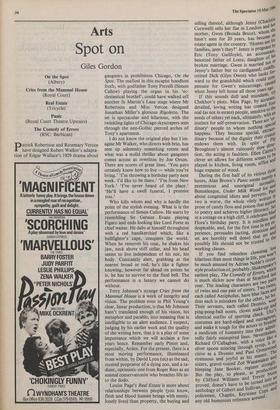Arts
Spot on
Giles Gordon
On the Spot (Albery)
Cries from the Mammal House (Royal Court)
Real Estate (Tricycle) Panic
(Royal Court Theatre Upstairs)
The Comedy of Errors (RSC: Barbican)
Patrick Robertson and Rosemary Vercoe have designed Robert Walker's adapta- tion of Edgar Wallace's 1929 drama about gangsters in prohibition Chicago, On the Spot. The mafiosi in this escapist hoodlum froth, with godfather Tony Perrelli (Simon Callow) playing the organ in his 'ec- clesiastical brothel', could have walked off another St Martin's Lane stage where Mr Robertson and Miss Vercoe designed Jonathan Miller's glorious Rigoletto. The set is spectacular and hilarious, with the twinkling lights of Chicago skyscrapers seen through the neo-Gothic pierced arches of Tony's apartment.
I do not know the original play but I im- agine Mr Walker, who directs with brio, has sent up solemnity something rotten and what was a stolid thriller about gangsters comes across as rewritten by Joe Orton. There are scores of great lines. 'You guys certainly know how to live — while you're living.' I'm throwing a birthday party next week. I'd like to be there.' I'm from New York.' I've never heard of the place.' `He'll have a swell funeral, I promise you.'
Who kills whom and why is hardly the point of the stylish evening. What is is the performance of Simon Callow. He starts by resembling Sir Geraint Evans playing Figaro and ends looking like Lord Forte as chief waiter. He dabs at himself throughout with a red handkerchief which, like a bullfighter's cape, conquers the world. When he removes his coat, he shakes his jaw, neck above stiff collar, and his head seems to live independent of his suit, his body. Constantly alert, grabbing at the nearest broad or rod, he's like a fighter knowing, however far ahead on points he is, he has to survive to the final bell. The performance is a luxury we cannot do without.
Terry Johnson's strange Cries from the Mammal House is a work of integrity and vision. The problem even in Phil Young's clear, linear production, is that Mr Johnson hasn't translated enough of his vision, his metaphor and parable, into meaning that is intelligible to an alert audience. I suspect, judging by his earlier work and the quality of the writing here, that it is a play of some importance which we will acclaim a few years hence. Remember early Pinter and, especially, Arden. For the present, there is a most moving performance, illuminated from within, by David Lyon (sic) as the sad, stunted proprietor of a dying zoo, and a ra- diant, optimistic one from Roger Rees as an animal conservationist who breathes life in- to the dodo.
Louise Page's Real Estate is more about relationships between people (you know, flesh and blood human beings with messy, lonely lives) than property, the buying and selling thereof, although Jenny (Charlotte Cornwell) sells her flat in London and her mother, Gwen (Brenda Bruce), whom she hasn't seen for 20 years, has become art estate agent in the country. 'Homes are for families, aren't they?' Jenny is pregnant by Eric (Tony Guilfoyle), an accountant' besotted father of Lotte, daughter of his broken marriage. Gwen is married not to Jenny's father but to cardiganed, cudal' wreatirrdedtoDtihcke g(GralnydnehOilwdenw)hiwehh could col' pensate for Gwen's miscarriage, caused when Jenny left home all those years ag°' If this sounds dull and mundane, ul Chekhov's plots. Miss Page, by accurate: detailed, loving writing has created WI' needs of fn otherso t i n e syt yet estate) people, o, ple ultimately,, en s ti we to ct)h ihrei instinct for self-preservation. These are 4v.al dinary' people to whom nothing sPecl, happens. They become special, extra°': dinary because of the dignity their creato` endows them with. In spite of PiP Broughton's almost ruinously slow clirec,: tion, the acting is faultless. Ellen Cairns_ clever set allows for different scenes to o'd played in kitchen, living room, office all huge expanse of wood.
During the first half of its vicious three
hours, Alan Brown's Panic seems merely ,...:: pretentious and unoriginal surreah) Bunuelesque, Under Milk Wood for past about congenital idiots and perverts• in two is worse, the whole vilely written. prose of candy floss and poison that asPicr7t to poetry and achieves higher illiteraeY.
in a cottage on a high cliff, it celebrates riol"
d Flora's birthday party. It is mindless a/leg. despicable, and, for the first time in rrt' perience, persuades (acting, direction d set are horribly well done) that art the
working classes. not be trusted to less If you find relentless clowning
hilarious than most things in life, You vi°11's. be much amused by Adrian Noble's circes style production of, probably, ShakesPelZich earliest play, The Comedy of Errors, w",,„1 yiseamrucrphesliicekaedrinngo cwhathraanctearst Sartreattwfoolpirtia-ss, of twins and one pair of sisters. TWO and each called Antipholus, have blue faces ho. thus each is mistaken for the other, hi?„,ar Their servants, each called Dromio, ro`nd ping-pong-ball noses, clown make-t1Potz's identical outfits of sporting check• costumes are hard-edged and outrageaor. and make it tough for the actors to bre. _tilt", a modicum of humanity into their °tress, tedly fairly uninspired lines. Neverthe. e a Richard O'Callaghan, with a voice
silver spoon mincing through syroP,
cisive as a Dromio and Paul Greeriw",e strenuous and joyful as his master. The sisters, gravel-voiced Zoe Wanamakerna“,.,. bleeping Jane Booker, register strotroYos But the play, to please, as Produc„„pa by Clifford Williams and Trevor 1.4t0"a0 proved, doesn't have to be turned In own anthology of Gilbert and Sullivan, tOrt,d policemen, Chaplin, Keystone Cops "'" any old humorous reference around.














































 Previous page
Previous page